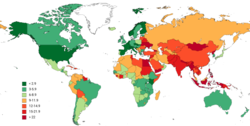Occupational cardiovascular disease
Editor-In-Chief: Prab R Tumpati, MD
Obesity, Sleep & Internal medicine
Founder, WikiMD Wellnesspedia &
W8MD medical weight loss NYC and sleep center NYC
| Occupational cardiovascular disease | |
|---|---|

| |
| Synonyms | N/A |
| Pronounce | N/A |
| Specialty | N/A |
| Symptoms | Chest pain, shortness of breath, fatigue, palpitations |
| Complications | Heart attack, stroke, heart failure |
| Onset | Varies, often related to work stress |
| Duration | Chronic |
| Types | N/A |
| Causes | Work-related stress, long working hours, sedentary lifestyle |
| Risks | High blood pressure, smoking, obesity, diabetes |
| Diagnosis | Electrocardiogram, blood tests, stress test |
| Differential diagnosis | Non-occupational cardiovascular disease |
| Prevention | Work-life balance, stress management, regular exercise |
| Treatment | Lifestyle changes, medication, counseling |
| Medication | N/A |
| Prognosis | Varies, depends on severity and management |
| Frequency | Increasing in high-stress occupations |
| Deaths | Significant, especially in high-stress environments |
Occupational Cardiovascular Disease is a type of cardiovascular disease that is caused or exacerbated by work-related factors. These factors can include physical strain, stress, exposure to harmful substances, and unhealthy lifestyle habits that are associated with certain occupations.
Causes
Occupational cardiovascular disease can be caused by a variety of work-related factors. These can include:
- Physical strain: Certain occupations require heavy physical labor, which can put strain on the heart and increase the risk of cardiovascular disease.
- Stress: High-stress jobs can contribute to the development of cardiovascular disease. Stress can lead to high blood pressure, which is a risk factor for heart disease.
- Exposure to harmful substances: Some jobs involve exposure to harmful substances that can damage the heart. For example, exposure to asbestos can increase the risk of heart disease.
- Unhealthy lifestyle habits: Certain occupations may encourage unhealthy lifestyle habits, such as smoking or a sedentary lifestyle, which can increase the risk of cardiovascular disease.
Symptoms
The symptoms of occupational cardiovascular disease can vary depending on the specific type of heart disease. However, common symptoms can include:
- Chest pain or discomfort
- Shortness of breath
- Fatigue
- Rapid or irregular heartbeat
- Dizziness or fainting
Prevention
Prevention of occupational cardiovascular disease involves addressing the work-related factors that can contribute to heart disease. This can include:
- Reducing physical strain at work
- Managing stress
- Avoiding exposure to harmful substances
- Promoting healthy lifestyle habits at work
Treatment
Treatment for occupational cardiovascular disease typically involves managing the underlying heart condition. This can include medication, lifestyle changes, and in some cases, surgery.
Gallery
See Also
Transform your life with W8MD's budget GLP-1 injections from $125.
W8MD offers a medical weight loss program to lose weight in Philadelphia. Our physician-supervised medical weight loss provides:
- Most insurances accepted or discounted self-pay rates. We will obtain insurance prior authorizations if needed.
- Generic GLP1 weight loss injections from $125 for the starting dose.
- Also offer prescription weight loss medications including Phentermine, Qsymia, Diethylpropion, Contrave etc.
NYC weight loss doctor appointments
Start your NYC weight loss journey today at our NYC medical weight loss and Philadelphia medical weight loss clinics.
- Call 718-946-5500 to lose weight in NYC or for medical weight loss in Philadelphia 215-676-2334.
- Tags:NYC medical weight loss, Philadelphia lose weight Zepbound NYC, Budget GLP1 weight loss injections, Wegovy Philadelphia, Wegovy NYC, Philadelphia medical weight loss, Brookly weight loss and Wegovy NYC
|
WikiMD's Wellness Encyclopedia |
| Let Food Be Thy Medicine Medicine Thy Food - Hippocrates |
Medical Disclaimer: WikiMD is not a substitute for professional medical advice. The information on WikiMD is provided as an information resource only, may be incorrect, outdated or misleading, and is not to be used or relied on for any diagnostic or treatment purposes. Please consult your health care provider before making any healthcare decisions or for guidance about a specific medical condition. WikiMD expressly disclaims responsibility, and shall have no liability, for any damages, loss, injury, or liability whatsoever suffered as a result of your reliance on the information contained in this site. By visiting this site you agree to the foregoing terms and conditions, which may from time to time be changed or supplemented by WikiMD. If you do not agree to the foregoing terms and conditions, you should not enter or use this site. See full disclaimer.
Credits:Most images are courtesy of Wikimedia commons, and templates, categories Wikipedia, licensed under CC BY SA or similar.
Contributors: Prab R. Tumpati, MD



